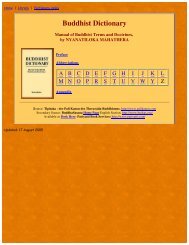Night and Morning with Bhikkhu Tissa
Night and Morning with Bhikkhu Tissa
Night and Morning with Bhikkhu Tissa
- No tags were found...
Create successful ePaper yourself
Turn your PDF publications into a flip-book with our unique Google optimized e-Paper software.
subtler aspect. This is the suffering or unsatisfactoriness of the saòkháras, the formations or elements of worldlyexistence themselves.Gene: How can mere formations “suffer”?<strong>Bhikkhu</strong> <strong>Tissa</strong>: According to the Buddha, all formations are impermanent. They are unstable, dependent,transitory, forever arising <strong>and</strong> subsiding, subject to change <strong>and</strong> decay. Within this change, this vast unrest,there is no permanence to be found <strong>and</strong> thus no stable peace. The components of our bodies hold togetheronly temporarily; gradually or swiftly they break up. Body <strong>and</strong> mind both are ultimately masses of mental<strong>and</strong> material happenings that will not hold still. Change never stops. Internally <strong>and</strong> externally the world onevery level is always subject to arising <strong>and</strong> breaking up, rearranging, falling away, disintegrating.Gene: What a thought! Ordinary pain, then, as bad as it is, is not the only kind of suffering.<strong>Bhikkhu</strong> <strong>Tissa</strong>: The very processes of existence, which bring us ordinary pain <strong>and</strong> pleasure, arethemselves flawed. Because of their instability, their unrest, they are untrustworthy—always tending toproduce new suffering. They give us no firm floor to st<strong>and</strong> on.Gene: But, <strong>Bhikkhu</strong> <strong>Tissa</strong>, there is happiness in the world. There are still joys <strong>and</strong> satisfactions <strong>and</strong>pleasures <strong>and</strong> many good <strong>and</strong> worthy things.<strong>Bhikkhu</strong> <strong>Tissa</strong>: Yes, that’s true. Certainly good things exist. But when the Buddha says that all formationsare dukkha he means that even when they are not manifestly painful, even when they are pleasant, theyalways have a liability to affliction. They are dukkha because they can’t last, can’t hold up.Gene: Suffering, then, is not always outright pain <strong>and</strong> misery? It can be just this elemental uncertainty orinstability?<strong>Bhikkhu</strong> <strong>Tissa</strong>: Yes. And that inevitably brings up, you see, another aspect of our suffering. Besides thefelt, experienced pain of body <strong>and</strong> mind, besides the uncertainty of all formations, there is the sufferinginherent in change. You see, even the good things, the beautiful <strong>and</strong> delightful things, become sources of actualpain on account of their fundamental nature.Gene: How can that be?<strong>Bhikkhu</strong> <strong>Tissa</strong>: They change, they pass away, <strong>and</strong> when they do we regret it; we suffer. Isn’t this natural?Anything we like, we want to last. But it cannot. Can you in fact think of anything in this world, anythingvaluable <strong>and</strong> important to you, which is immune to change, which can never grow old, which can neverdisappear, which can never disappoint you?Gene (frowning, thinking): No…. I can’t think of anything like that. All the good things—<strong>and</strong> the bad, too—are temporary, as far as I can tell.<strong>Bhikkhu</strong> <strong>Tissa</strong>: And don’t forget the desires themselves—the desires for the agreeable <strong>and</strong> pleasant things.They too arise <strong>and</strong> pass away unpredictably, <strong>and</strong> what you wanted yesterday you may no longer want today.Gene: I guess that’s true. Objects change <strong>and</strong> my opinions <strong>and</strong> desires change too. Likes <strong>and</strong> dislikes arevariable.<strong>Bhikkhu</strong> <strong>Tissa</strong>: There it is again, you see—the idea you came in <strong>with</strong>. Impermanence.Gene: Well, yes, you’re right. Impermanence!<strong>Bhikkhu</strong> <strong>Tissa</strong>: The word that popped into your mind when the dragonfly flew away.Gene: Impermanence again. This is what you meant, I guess, when you spoke of returning to primarymatters. This dukkha, venerable sir, is more formidable than I imagined. What a universe this is! And here Ithought you might cheer me up!<strong>Bhikkhu</strong> <strong>Tissa</strong> (smiling): Ah, but let’s investigate more. Let’s follow the Buddha a little further, shall we?(Outside, in the distance, lightning flickers suddenly. After a moment the rumble of thunder is heard. Gene raises hishead <strong>and</strong> gazes out into the darkness.)Gene: Uh-oh, we’re going to get some rain. Maybe a thunderstorm.<strong>Bhikkhu</strong> <strong>Tissa</strong> (easily): Quite likely. But it will pass; it will change. Just more impermanence, right?6
















